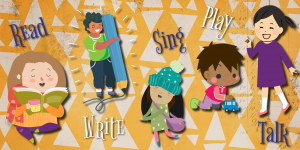
Singing with your child has significant social-emotional value, which is extra important during the pandemic when children may not be getting the benefits of physical interaction with other kids. Social-emotional learning is how children develop self- and social-awareness, such as relationship skills, emotional regulation, and self-confidence.
When we sing, we are practicing aerobic activity that requires us to take deep breaths which helps to reduce stress and increase alertness. If we are feeling caught in our emotions, singing can help us redirect our focus and find calmness. It is a great self-soothing technique.
Music has a rich social history and when we sing together, we support bonding and connection. Children must look for facial cues and work to sync up their words with other’s voices. Most children don’t feel like singing is hard work, so it’s a fun way to build your child’s brain.
Babies
- Introduce your child to songs with positive affirmations that help them begin to understand how to feel good about themselves.
- One way to model healthy self-care is to play calming music when your baby gets upset. You can stream music free from the library on Freegal!
Toddler & Preschoolers
- “Modeling” is showing your child how to do something. Singing together and taking turns is an excellent way to demonstrate how to work together in a positive way.
- Try talking about how certain songs make you feel. One of the best ways to help our children begin to develop emotional literacy is to name feelings!
- When your child is focusing on a particular task, play instrumental music that your child likes.
- When your child is struggling with a task, try making up a song about getting through the problem. “Nico can do it, yes he can! He tries so hard like Superman!”
- Try calling or video chatting someone you love and sing them a song together! Doing nice things for others helps to build empathy and prosocial behavior.
- Watch performances together on Qello and have your own in-home concert!
Remember that all children develop at their own pace and in their own way. For a list of expected social-emotional milestones, visit understood.org.
-Taylor, Children's Librarian at Quincie Douglas Library
Resources
Social-Emotional Learning: What You Need to Know by Alexis Clar, MA, MS
Beyond Twinkle, Twinkle: Using Music with Infants and Toddlers by Claire Lerner and Rebecca Parlakian
 Read, Write, Talk, Sing, Play!
Read, Write, Talk, Sing, Play!
Singing is incredibly engaging for children and has countless early literacy benefits, which include building vocabulary, slowing down language, developing memory skills, and so much more!
Read more about early literacy and how you can make a difference in your child's life.

